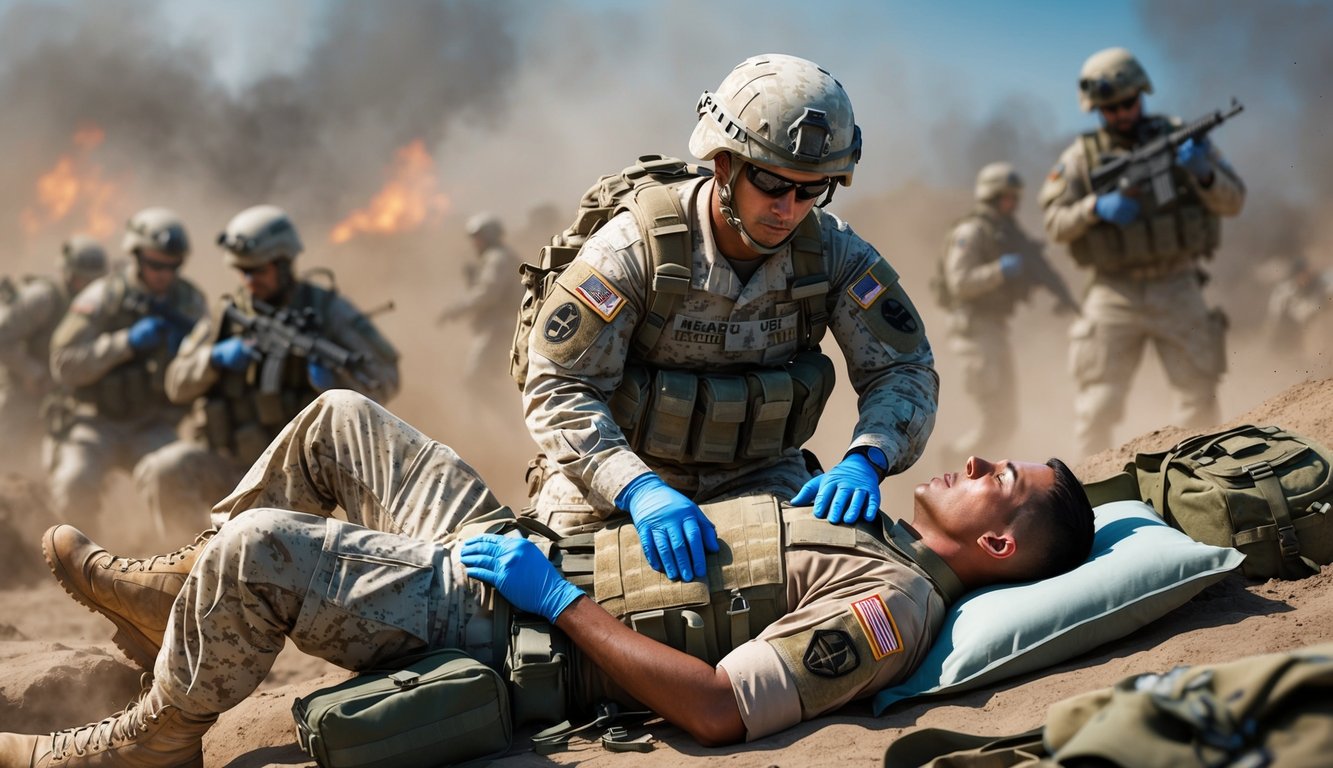“`xml
Combat Medic Specialists, designated as 68W in the U.S. Army, are essential in preserving lives both on the battlefield and in humanitarian efforts.
These experts provide urgent medical care in combat scenarios as well as during humanitarian missions.
As a Combat Medic Specialist, your responsibilities will include administering first aid, prioritizing injuries, and safely evacuating patients from perilous environments.
You will operate similarly to a civilian paramedic, but in the high-pressure setting of the military.
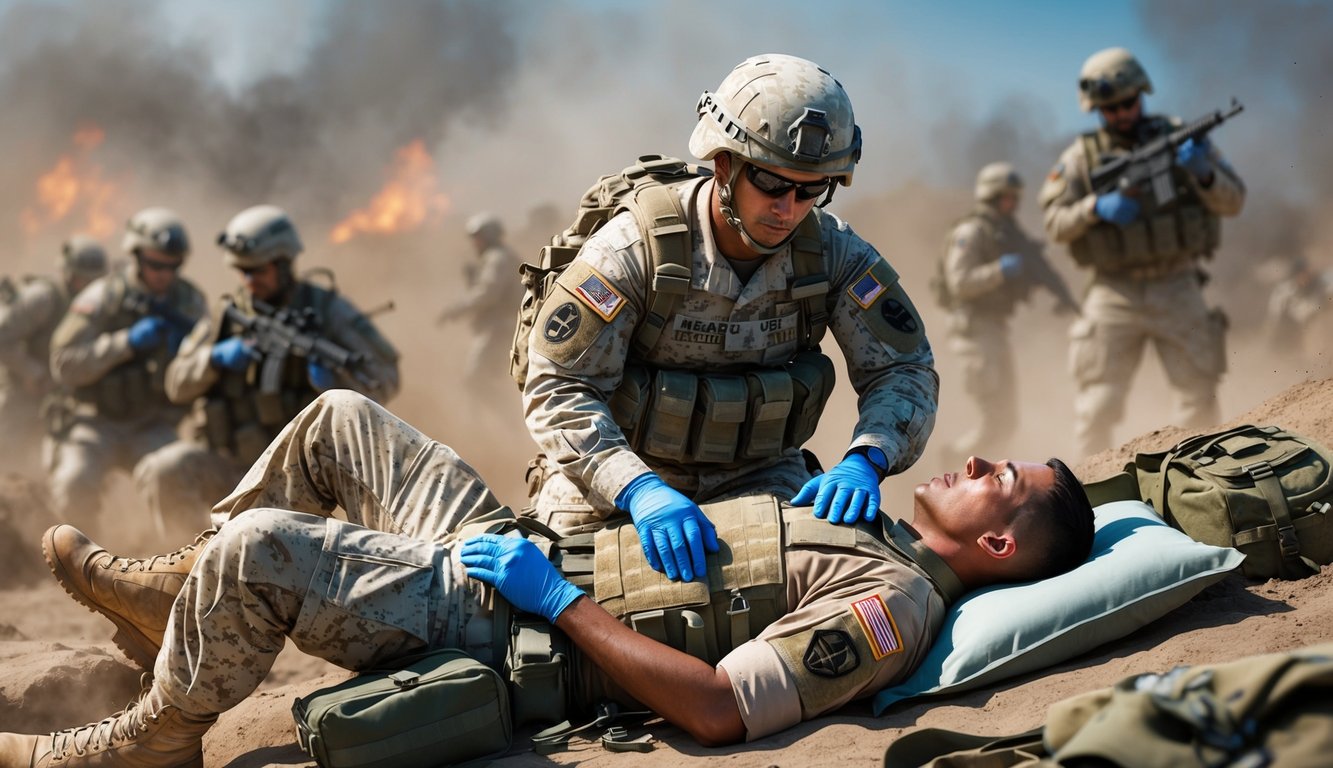
Your path to becoming a 68W begins with Basic Combat Training, followed by specialized medical instruction.
You will acquire vital skills such as wound treatment, trauma management, and medication administration.
This demanding yet fulfilling career path offers avenues for advancement and the opportunity to significantly impact lives.
Key Points
- Combat Medic Specialists deliver crucial emergency care in both military and humanitarian contexts.
- Training encompasses combat skills along with advanced medical techniques.
- This career provides opportunities for growth and the rewarding experience of saving lives.
Overview of the Combat Medic Specialist Role
Combat Medic Specialists are indispensable members of the U.S. Army’s medical team, offering essential emergency care both in combat situations and humanitarian locations, thus safeguarding lives through their extensive training and capabilities.
Responsibilities and Duties
In your role as a Combat Medic Specialist, you will serve as the medical frontline for fellow soldiers.
Your core duty involves providing emergency medical treatment at the injury site.
This includes triaging patients, stabilizing injuries, and evacuating those requiring assistance from hazardous circumstances.
In combat zones, you will operate under significant pressure to deliver lifesaving interventions.
During peacetime, you’ll also provide basic care and health protection to soldiers.
Your skills will mirror those of a civilian paramedic, with additional training tailored to military settings.
You will also instruct other soldiers on basic first aid and lifesaving techniques, fostering a more resilient and prepared military force.
Path to Becoming a Combat Medic
To become a Combat Medic Specialist (MOS 68W), enlisting in the U.S. Army and completing dedicated training is essential.
This journey will commence with Basic Combat Training, followed by Advanced Individual Training.
Your medical training transpires during a comprehensive 16-week program at the Medical Education and Training Campus.
This intensive curriculum is divided into three segments:
- Emergency Medical Technician (EMT) certification
- Advanced medical competencies
- Combat-specific medical techniques
The rigorous training is rewarding.
You will master:
- Executing emergency medical interventions
- Managing trauma situations
- Administering medications
- Utilizing medical equipment effectively
After completing the program, you will achieve certification as both an EMT and a Combat Medic Specialist, enhancing your value to the Army and broadening future civilian career possibilities.
Training and Education Path
Your journey to becoming a Combat Medic Specialist (68W) entails thorough training phases.
You’ll navigate through Basic Combat Training, Advanced Individual Training, and Specialized Skill Training to cultivate the necessary medical and military expertise.
Basic Combat Training
Your journey begins with 10 weeks of Basic Combat Training (BCT), during which you will transition from civilian life to military soldier.
BCT centers on physical fitness, weapons training, and the essential values of the Army.
You’ll gain fundamental military skills such as marching, land navigation, and operational tactics.
This intense training pushes your physical and mental boundaries and fosters strong camaraderie with your fellow recruits as you face challenges together.
By the end of this phase, you’ll be prepared for the next step in your 68W journey.
Advanced Individual Training
Following BCT, you’ll attend 16 weeks of Advanced Individual Training (AIT) at Fort Sam Houston, Texas, where you will acquire the specific medical knowledge and skills vital for a Combat Medic.
The curriculum encompasses anatomy, physiology, and emergency medical protocols.
You will learn how to address battlefield injuries, execute triage, and efficiently evacuate casualties.
Practical training with medical equipment is crucial, alongside instruction in pharmacology and medication administration.
This training is rigorous yet fulfilling, gearing you up for the life-saving role you will play in combat scenarios.
Specialized Skill Training
Upon completing AIT, there may be options for further specialized training, which could include tactical combat casualty care, aeromedical evacuation, or advanced skills in special operations medicine.
You could receive training in unique environments, ranging from arctic to jungle terrains.
Some medics seek certifications as Emergency Medical Technicians (EMTs) or Paramedics.
Continued education can lead to opportunities in Special Forces or flight medicine roles.
The Army also facilitates further education, potentially steering you toward nursing or physician assistant careers.
Ongoing learning is encouraged to maintain sharp skills and advance your medical knowledge.
Medical and Clinical Capabilities
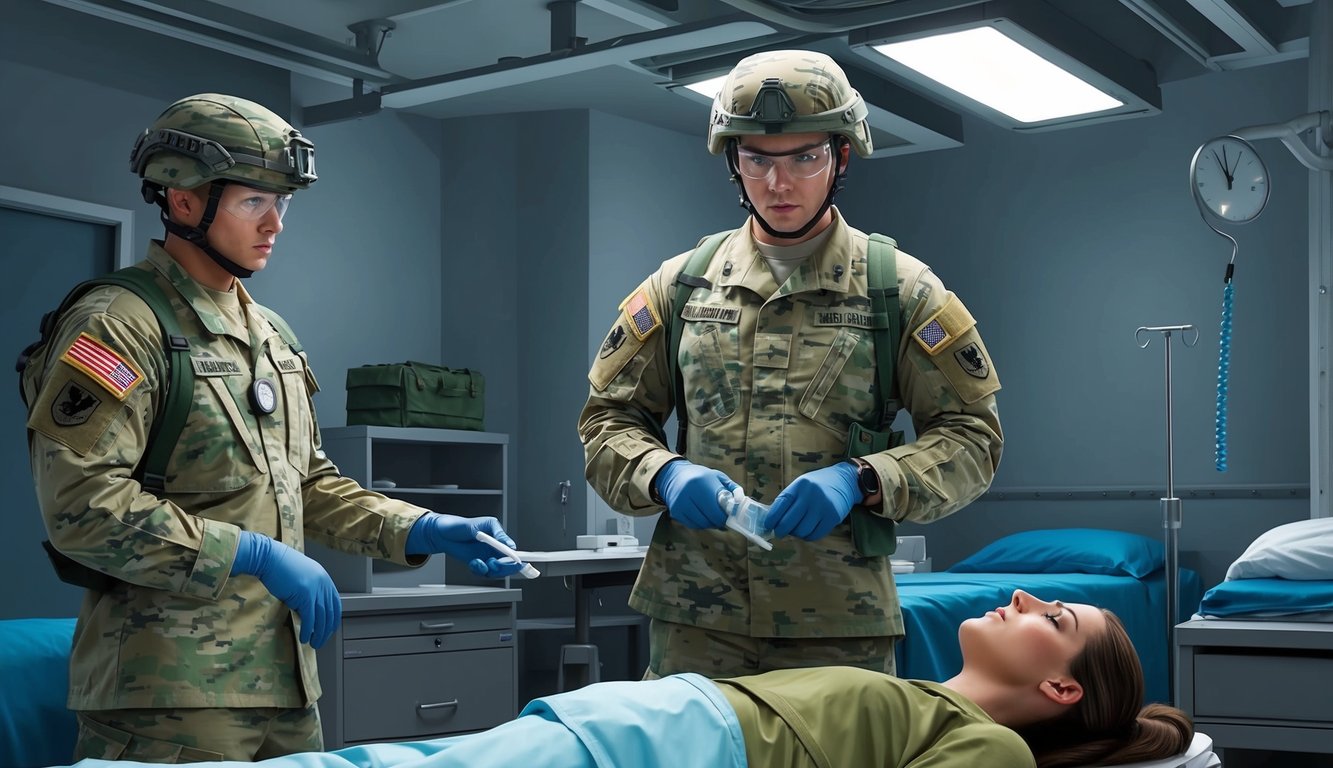
Combat Medic Specialists cultivate a wide array of medical and clinical skills to deliver lifesaving care in demanding environments.
These competencies enable you to respond adeptly to emergencies, furnish basic primary care, and apply specialized tactical medical procedures.
Emergency Medical Treatment
As a 68W, you will become adept in emergency medical practices to treat injuries and trauma observed in battlefield settings.
You will quickly evaluate patients and provide prompt interventions, such as controlling severe bleeding, managing airways, and addressing shock.
Your training encompasses wound management, immobilizing fractures, and administering intravenous fluids and medications.
You will gain proficiency with medical equipment including cardiac monitors, oxygen delivery systems, and trauma kits.
Triage skills will enable you to prioritize care during mass casualty events.
You will rehearse rapid patient assessments to identify critical conditions needing immediate attention.
Limited Primary Care
Your responsibilities also include basic primary care and health safeguarding duties.
You will be trained to perform health assessments, give vaccines, and conduct routine medical treatments.
This positions you to meet the ongoing health needs of your unit.
You will encounter common illnesses and minor injuries, allowing you to provide suitable care and ascertain when referrals for advanced treatment are necessary.
Your understanding of preventive medicine will also assist you in educating your fellow soldiers on maintaining health in austere conditions.
Tactical Combat Casualty Care
Tactical Combat Casualty Care (TCCC) protocols are fundamental aspects of your skill set as a combat medic.
You will master specialized techniques for delivering care in active combat situations and performing tactical field care.
This includes swiftly transporting casualties to safety while providing cover fire as needed.
You will become proficient in the use of tourniquets, hemostatic agents, and performing needle decompression to address tension pneumothorax.
TCCC training emphasizes rapid patient evacuations and preparation for transport.
You will put these skills into practice during realistic field training exercises to develop muscle memory for combat scenarios.
Roles in Various Contexts
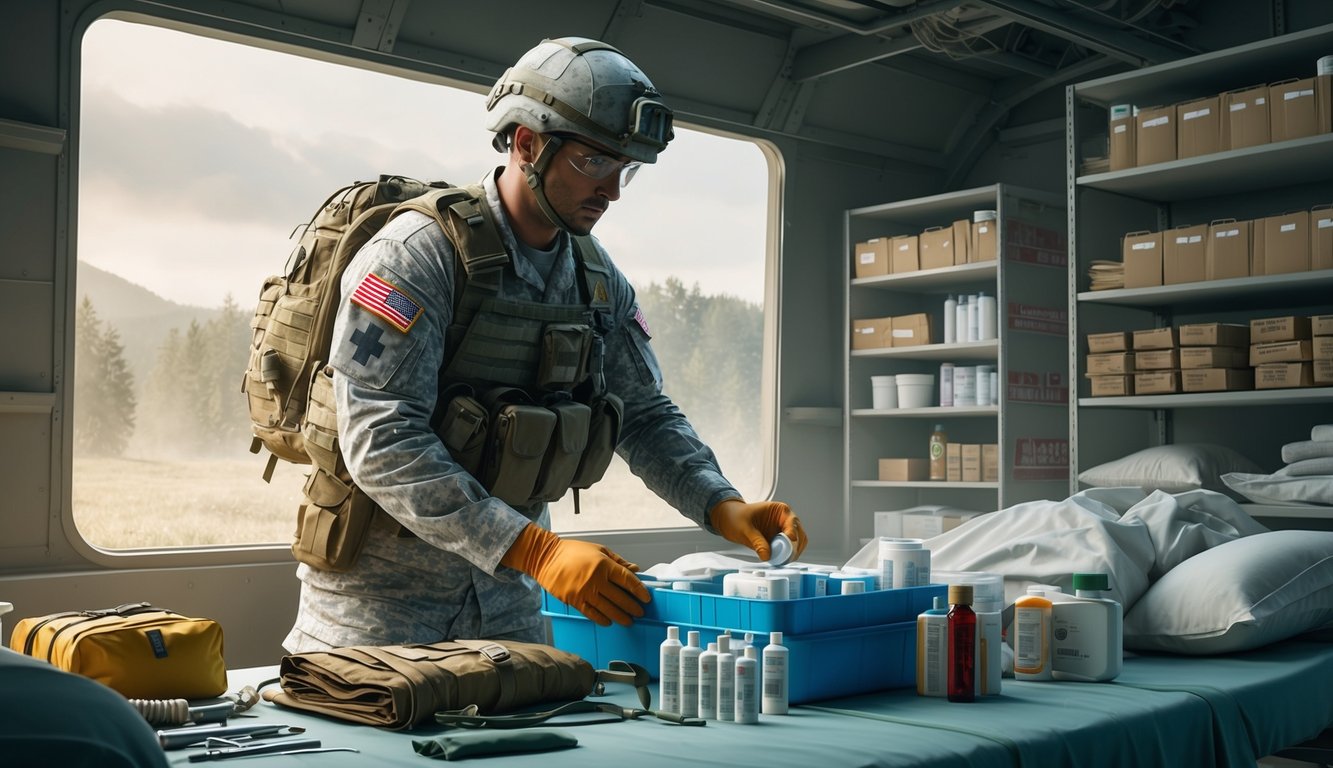
Combat Medic Specialists (68W) serve across diverse environments, adapting their skills to fulfill medical responsibilities in high-stress combat situations and clinical support roles.
Your adaptability as a 68W is vital for delivering effective care within varied military settings.
Battlefield Operations
During battlefield operations, you will be the primary medical support.
Your central task is to offer emergency medical assistance at the scene of injuries.
You will swiftly evaluate injuries, prioritize treatments, and stabilize patients for evacuation.
Your combat medic abilities include halting severe bleeding, airway management, and shock intervention.
Working under extreme pressure and often in hazardous conditions relies on your capacity to remain composed and focused.
You will also train fellow troops in basic first aid, which improves unit survival rates.
Your responsibilities as a 68W will include:
- Delivering emergency medical interventions
- Coordinating casualty evacuations
- Ensuring readiness of medical equipment
- Providing tactical combat casualty assistance
Clinical Support
In clinical environments, your role transitions to delivering comprehensive medical care.
You’ll be stationed at military hospitals, clinics, and aid stations.
Your duties will broaden to include:
- Assisting with patient evaluations and treatments
- Dispensing medications
- Conducting basic lab procedures
- Maintaining patient records
Collaborating with doctors and nurses, you will gain experience in various medical specialties.
This clinical exposure enhances your proficiency as a health care provider.
Your training as a National Registry of Emergency Medical Technician will be invaluable in these settings.
You will utilize these skills to offer high-quality care to service members and their families.
Career Development and Opportunities

As a Combat Medic Specialist (68W), you can explore numerous avenues for career advancement and enriching opportunities to enhance your skills.
Your role is critical within both military and civilian spheres, paving the way for gratifying careers.
Advancing in Rank
You have the potential to progress from Private to Sergeant Major as a 68W.
Each rank advancement comes with increased responsibilities and leadership roles.
As a Specialist or Corporal, you will focus on refining your medical abilities and may participate in the Best Medic Competition.
At the non-commissioned officer level, you’ll be responsible for training junior medics and overseeing administrative duties.
Sergeants First Class may take on roles as platoon sergeants or instructors.
Master Sergeants and Sergeant Majors often serve as senior advisors and may receive the Order of Military Medical Merit in recognition of their contributions.
Civilian Transition
Your training as a 68W translates seamlessly into civilian healthcare careers.
Many combat medics pursue positions as EMTs or paramedics after their service.
With further education, you can aim for nursing, physician assistant roles, or even medical doctor positions.
The National Guard provides a unique opportunity for part-time service while engaging in civilian healthcare.
Your military medical experience is highly regarded in emergency departments, trauma centers, and ambulance services.
Some veterans, such as James Musnicki, have even established their own medical training companies utilizing the expertise gained as combat medics.
Supporting Your Career Path
The Army provides robust support systems for 68W Combat Medic Specialists to advance their careers.
Numerous opportunities exist to refine your skills and pursue education while on duty.
Education Benefits
You can benefit from tuition assistance programs to seek higher education.
The Army covers as much as 100% of tuition for qualified courses, facilitating the acquisition of degrees or certifications.
The GI Bill also offers significant support for college or vocational training following your service.
Many 68W specialists utilize these benefits to become nurses, physician assistants, or explore other healthcare professions.
Access to online learning platforms and military-specific courses allows you to broaden your knowledge base.
The Army’s education centers can provide guidance in choosing programs and the application process.
Skill Development
As a 68W, you’ll have avenues to specialize and acquire advanced skills.
You might attend further training to become a Flight Medic, Special Operations Medical Sergeant, or pursue other specialty titles within the Army Medical Department.
The Army offers various courses designed to enhance your medical expertise, leadership skills, and technical abilities.
You may engage in advanced trauma care, field sanitation, or tactical combat casualty care training.
Many 68Ws also seek civilian certifications, such as EMT-Paramedic, to bolster their credentials.
Gaining experience on the job is crucial for skill enhancement.
Working alongside qualified healthcare professionals will provide hands-on experience in varied medical settings.
This practical knowledge will enhance your capabilities and prepare you for career progression.
Enlistment Journey
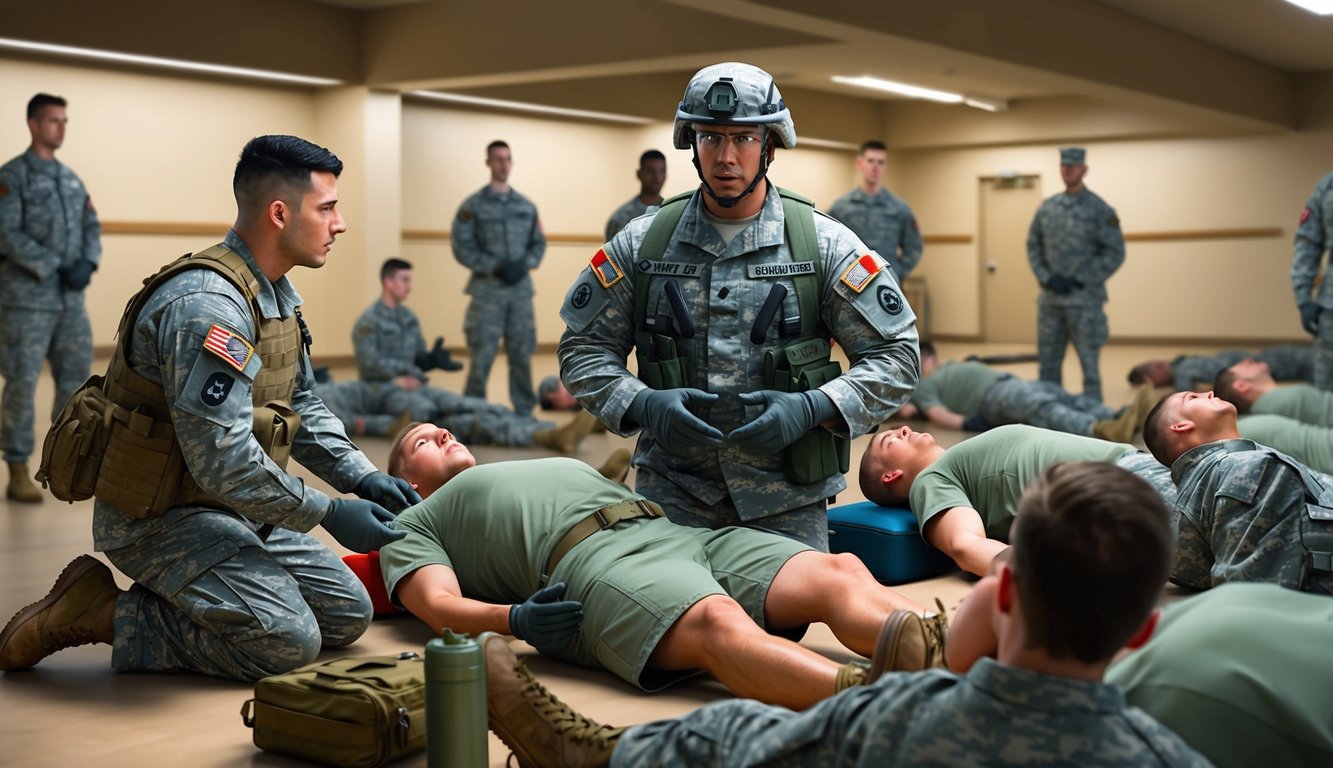
Becoming a Combat Medic Specialist 68W involves navigating the Army’s enlistment process.
You will need to meet specific requirements and collaborate closely with recruiters to join this prestigious medical role.
Recruitment Steps
To initiate your path as a 68W, visit your nearest Army recruiting office or access goarmy.com.
A recruiter will assist you through the enlistment steps.
You will need to provide personal information such as your full name, birth date, email address, phone number, and zip code.
This information will be used for recruiting purposes under Title 10 of the United States Code and EO 9397.
Be prepared to discuss your educational background, work history, and medical conditions.
Your recruiter can clarify details regarding the role and outline the commitment involved.
They will also explain the benefits of serving as a Combat Medic Specialist.
Eligibility Criteria
To qualify as a 68W, you must be a U.S. citizen or a permanent resident alien.
Age requirements are typically between 17 and 35 years.
A high school diploma or equivalent is mandatory.
The Army requires you to achieve a minimum score on the Armed Services Vocational Aptitude Battery (ASVAB) test.
Physical fitness is imperative.
You must successfully complete the Army Physical Fitness Test and conform to height and weight standards.
A clear medical history is essential, along with the capacity to obtain security clearance.
The training involves 10 weeks of Basic Combat Training, succeeded by 16 weeks of Advanced Individual Training.
During this period, you will learn key medical abilities and achieve your National Registry Emergency Medical Technician (NREMT) certification.
Life as a Combat Medic
As a Combat Medic Specialist, you will experience a distinctive combination of medical and military duties.
Your role merges intensive medical responsibilities with the challenges of military life, presenting various opportunities for personal and professional growth.
Routine Responsibilities
Your daily life as a 68W is diverse and demanding.
You will typically start early, often before dawn, with physical training to sustain your fitness.
After breakfast, you may conduct checks of medical supplies or attend briefings regarding forthcoming missions.
Throughout the day, you will:
- Provide emergency medical treatment to soldiers
- Assist in sick call clinics
- Carry out health and hygiene inspections
- Educate fellow soldiers on basic first aid
In combat situations, you will assume the role of the initial responder on the battlefield.
You will treat injuries, stabilize patients, and coordinate medical evacuations while under immense pressure.
Benefits of Lifestyle
As a Combat Medic, you will enjoy unique advantages associated with military service.
The Army provides:
- Free housing or a housing allowance
- Comprehensive healthcare benefits
- Regular meals at dining facilities
- Opportunities for further education
You will have access to on-base fitness centers, recreational facilities, and discounted shopping options.
Additionally, the Army grants 30 days of paid vacation annually, allowing you to either travel or spend time with family.
Your medical skills easily transfer to civilian careers.
Many Combat Medics transition into roles as paramedics, nurses, or doctors post-service.
The Army may even assist in funding your medical education should you choose to pursue that route.
Common Questions
Individuals aspiring to become Combat Medic Specialists frequently have queries regarding the role, qualifications, and training.
Below are answers to some prevalent questions concerning the 68W MOS.
What qualifications are required to be a 68W MOS Army Combat Medic?
A high school diploma or equivalent is necessary.
A minimum ASVAB score of 107 in the Skilled Technical (ST) category is required, as well as passing a medical assessment and background check.
U.S. citizenship is a prerequisite.
You should possess a keen interest in healthcare and the ability to remain calm during stressful situations.
Can you detail the daily tasks of a Combat Medic Specialist?
Your tasks involve delivering emergency medical care in the field, treating injuries, administering medications, and stabilizing patients for transportation.
You will also assist with routine healthcare responsibilities and impart basic first aid training to other soldiers.
Part of your duties includes maintaining medical equipment and supplies.
What duration is the training for an Army combat medic, and where does it take place?
The total training period is about 16 weeks.
It begins with 10 weeks of Basic Combat Training, followed by 16 weeks of Advanced Individual Training.
Training takes place at Fort Sam Houston in San Antonio, Texas, where you will acquire both military and medical skills.
Do Combat Medics earn EMT or paramedic certification during training?
Yes, you will earn EMT certification as part of your training program.
This equips you to pass the National Registry of Emergency Medical Technicians (NREMT) examination.
This certification holds value in the civilian sector, providing you credible qualifications for future career paths.
What is the average salary for a 68W Combat Medic in the Army?
Your earnings depend on your rank and years of service.
As an entry-level E-1, your monthly salary is approximately $1,785.
As you rise through ranks and gain experience, your pay will scale up.
Additional benefits such as housing allowances and healthcare are also included.
Will I have to engage in combat situations as a Combat Medic?
Yes, deployment to combat zones may be part of your role.
While your primary function is to deliver medical care, you also undergo combat training.
You must be prepared to treat injuries amid hostile situations and possibly defend yourself and your patients.
Your duties integrate both medical and military responsibilities.
“`

